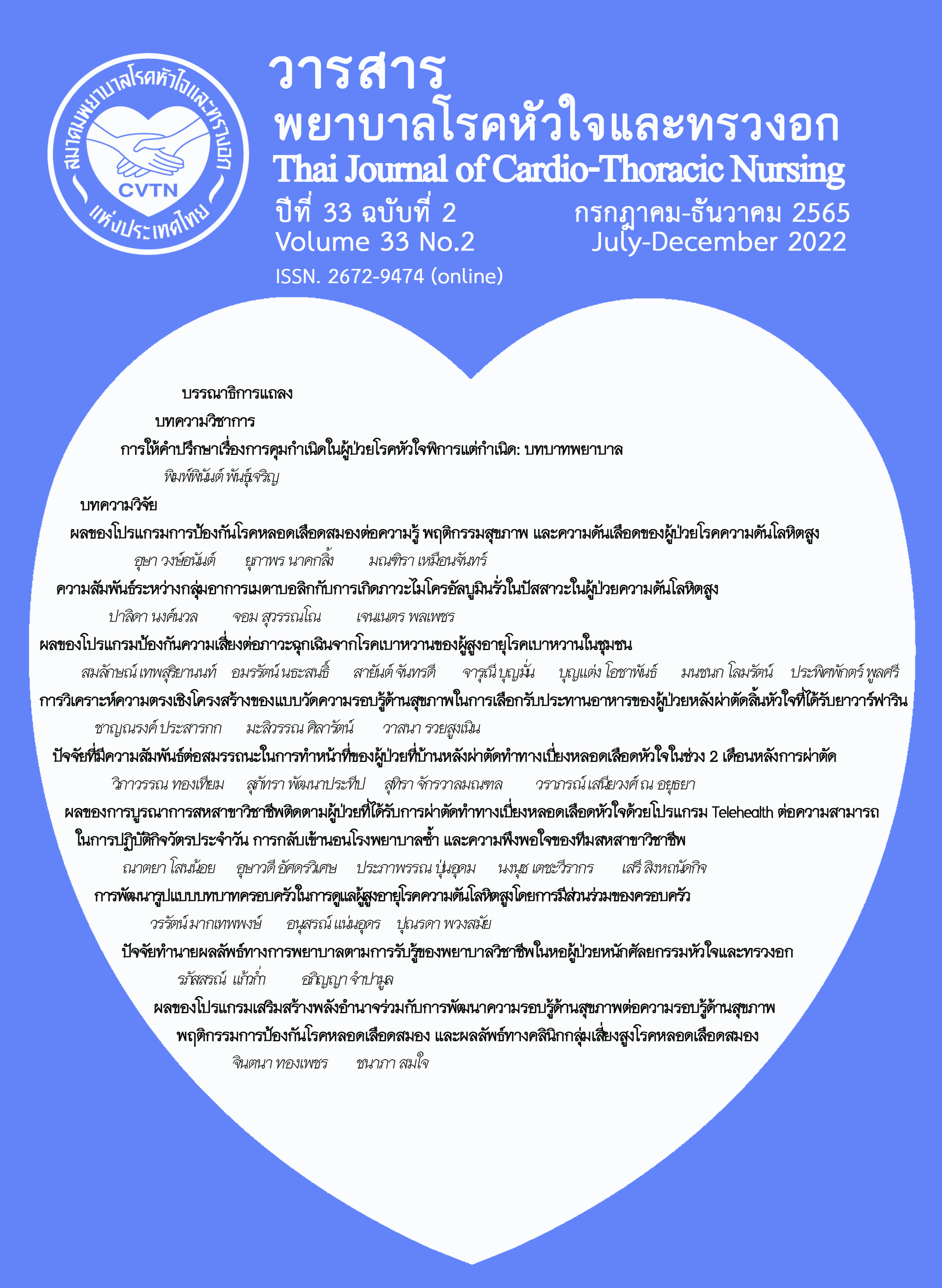ผลของโปรแกรมการป้องกันโรคหลอดเลือดสมองต่อความรู้ พฤติกรรมสุขภาพ และความดันเลือดของผู้ป่วยโรคความดันโลหิตสูง
คำสำคัญ:
โปรแกรมการป้องกันโรคหลอดเลือดสมอง, โรคความดันโลหิตสูง, พฤติกรรมสุขภาพ, ความดันเลือดบทคัดย่อ
การวิจัยครั้งนี้เป็นการวิจัยแบบกึ่งทดลอง 2 กลุ่ม วัดก่อนหลัง (Two group Pretest–Posttest Design) เพื่อศึกษาผลของโปรแกรมการป้องกันโรคหลอดเลือดสมองต่อความรู้ พฤติกรรมสุขภาพ และความดันเลือดของผู้ป่วยโรคความดันโลหิตสูง กลุ่มตัวอย่างคือผู้ป่วยโรคความความดันโลหิตสูง จำนวน 60 คน แบ่งเป็นกลุ่มทดลอง 30 คน เป็นกลุ่มที่ได้เข้าร่วมโปรแกรมการป้องกันโรคหลอดเลือดสมองที่พัฒนาจากทฤษฎีแบบแผนความเชื่อด้านสุขภาพเป็นระยะเวลารวม 12 สัปดาห์ กลุ่มเปรียบเทียบ 30 คนจะได้รับบริการปกติจากโรงพยาบาลส่งเสริมสุขภาพตำบล เครื่องมือที่ใช้ในการเก็บรวบรวมข้อมูลประกอบด้วยแบบสอบถามข้อมูลส่วนบุคคล แบบทดสอบความรู้ และแบบสอบถามพฤติกรรมสุขภาพ วิเคราะห์ข้อมูลด้วยสถิติเชิงบรรยาย Wilcoxon signed ranks test. Mann-Whitney U test และ Chi-square test
ผลการศึกษา พบว่า หลังเข้าร่วมโปรแกรมการป้องกันโรคหลอดเลือดสมอง กลุ่มทดลองมีคะแนนความรู้ และพฤติกรรมสุขภาพสูงกว่าก่อนทดลองและสูงกว่ากลุ่มเปรียบเทียบอย่างมีนัยสำคัญทางสถิติ (p= .000) และมีการเปลี่ยนแปลงของระดับความดันโลหิตหลังการทดลอง กลุ่มทดลองสามารถควบคุมระดับความดันโลหิตให้อยู่ในระดับที่ยอมรับได้ (<140/90 มม.ปรอท) มากกว่าก่อนทดลองและมากกว่ากลุ่มเปรียบเทียบอย่างมีนัยสำคัญทางสถิติ (p= .000)
ข้อเสนอแนะการศึกษานี้ เป็นแนวทางส่งเสริมให้ผู้ป่วยโรคความดันโลหิต สามารควบคุมระดับความดันโลหิตให้อยู่ในเกณฑ์ปกติ ช่วยลดโอกาสการเกิดโรคหลอดเลือดสมองได้
เอกสารอ้างอิง
Prasat Neurological Institute. Care map for hemorrhagic stroke. Wang Thonglang (BKK): Tanapress Printing; 2019. (in Thai).
The Policy and Strategy Section, Bureau of Non-Communicable Disease, Ministry of Public Health. 5-Year National of non-communicable disease prevention and control strategic and action plan (2017- 2021). Bangkok: Emotion Art Printing; 2017. (in Thai).
Sinsap N, Jankra J, Jaiman B. Hypertension in elderly: silence killer should be aware. Journal of Phrapokklao Nursing College. 2017; 28(1): 100-111. (in Thai).
Department of Disease Control. Non-communicable diseases. [Internet]. 2018. [cited 2020 June 1]. Available from: http://www.thaincd.com/2016/mission/documents-detail.php?id=13684&tid=32& gid=1-020. (in Thai).
Chareonsin S. Factors affecting Stroke prevention behavior in ypertention Patients, Mueang District, Nakhon Sawan Province [Master of Public Health]. Phitsanulok :Naresuan University; 2021. (in Thai).
Kongvivat K, Lemsawasdikul W, Nuysri M. Effects of preventive behavior developing program for patients with cerebrovascular disease risk at Kanchanaburi province. Journal of Nursing and Health Care. 2017; 35(3): 129-137. (in Thai).
Thongbu P, Potisupsuk C, Nontasawatsr S. Effects of a self-health promotion program for elderly patients with uncontrolled hypertension in Tambon Laoluang, Kasetwisai District, Roi-Et Province. Thai Journal of Nursing. 2019; 68(4): 1-10. (in Thai).
Siriraj Stroke Center. How is cerebrovascular disease treated? [Internet]. 2020 [cited 2020 June 5]. Available from: https://www.si. mahidol. ac.th/center/sirirajstrokecenter/TH/StrokeContent/content/people/cure- stroke.aspx. (in Thai).
Bunset P, Piyabanditkul L. Effectiveness of Stroke prevention program for high risk group at Hoiybong sub-district, Muang district, Chaiyaphum province. Journal of Sakon Nakhon Hospital. 2018; 21(2), 28-41. (in Thai).
Klinsakorn C, Saetan S. Factors related to self-protective behavior of stroke with controlled hypertention patients who live in Danchang district, Suphanburi province. Journal of Council of Community Public Health. 2020; 2(2): 62-77. (in Thai).
Goldmann E, Jacoby R. Finfer E, Appleton N, Parikh NS, Roberts ET, et al. Positive health beliefs and blood pressure reduction in the DESERVE Study. J Am Heart Assoc. 2020; 9(9), 424-28.
Phetphum Ch. Health behaviors concepts theories and applications. 3th ed. Phitsanulok: Naresuan University; 2019. (in Thai).
Hirungerd S, Vutiso P, Srimongkol M. The effects of health belief model program on knowledge, Stroke prevention behavior and blood pressure levels in hypertensive patients the responsibility area of Kaeng Khro hospital, Chaiyaphum province. Journal of The Royal Thai Army Nurses. 2021; 22(1): 478-87. (in Thai).
Miao J, Wang H, Liu N. The evaluation of a nurse-led hypertension management model in an urban community healthcare. Medicine (Baltimore). 2020; 99(27): e20967.
Sompol Ch, Rawiworakul Th, Kirdmongkol P. Effects of a Stroke prevention program for older adults with hypertension. Journal of Public Health Nursing. 2017;31(special): 57-73. (in Thai).
H Song, K.A. Nam. Effectiveness of a Stroke risk self-management intervention for adults with prehypertension. Asian Nurs Res. 2015;9: 328-35.
Bang Phun 1,2 Health Promoting Hospital. Statistical data of patients with hypertension. (June 1-30. 2020). Pathum Thani ;2020
Murdaugh CL, Parsons MA, Pender NJ. Health promotion in nursing practice. 8th ed. New York: Pearson; 2019.
Kawthaisong C, Dungsong R. Effects of behavioral development program for Stroke prevention among hypertensive patients in Chumpuang hospital, Chumpuang district, Nakhon Ratchasima province. Srinagarind Medical Journal. 2014; 29(3): 295-303. (in Thai).
Nualnetr N, Srikha D. Knowledge on the stroke and behaviors to reduce the risk of stroke among risk persons in Samliam community, Muang district, Khon Kaen province. Journal of Medical Technology and Physical Therapy. 2012; 24(3): 318-26. (in Thai).
Goodfriend LN. The effect of hypertension education on knowledge, lifestyle behaviors and blood pressure management among parishioners in a faith-based setting. Health Sciences Research Commons. [Internet]. 2020 [cited 2020 June 5]. Available from: https://hsrc.himmelfarb.gwu.edu/cgi/viewcontent.cgi?article=1074&context=son_
ดาวน์โหลด
เผยแพร่แล้ว
รูปแบบการอ้างอิง
ฉบับ
ประเภทบทความ
สัญญาอนุญาต
ลิขสิทธิ์ (c) 2023 วารสารพยาบาลโรคหัวใจและทรวงอก

อนุญาตภายใต้เงื่อนไข Creative Commons Attribution-NonCommercial-NoDerivatives 4.0 International License.
บทความนี้ยังไม่เคยตีพิมพ์หรืออยู่ในระหว่างส่งไปตีพิมพ์ในวารสารอื่น ๆ มาก่อน และกองบรรณาธิการขอสงวนสิทธิ์ในการตรวจทาน และแก้ไขต้นฉบับตามเกณฑ์ของวารสาร ในกรณีที่เรื่องของท่านได้ได้รับการตีพิมพ์ในวารสารฉบับนี้ถือว่าเป็น ลิขสิทธิ์ของวารสารพยาบาลโรคหัวใจและทรวงอก






